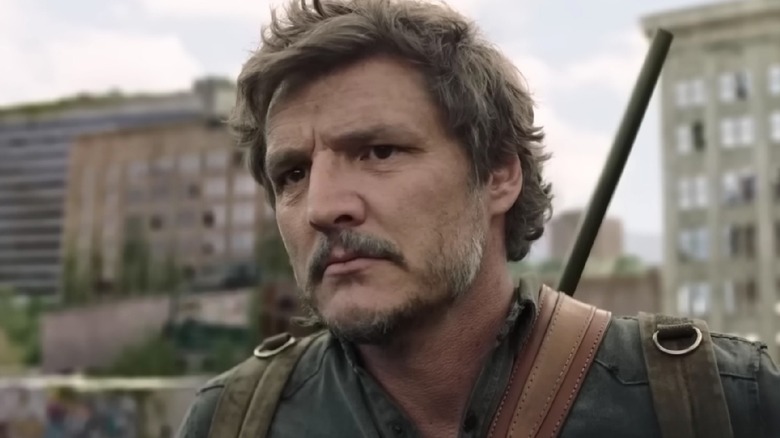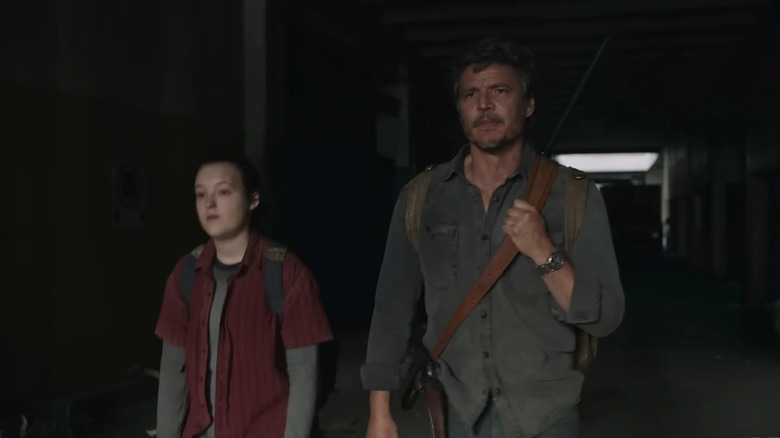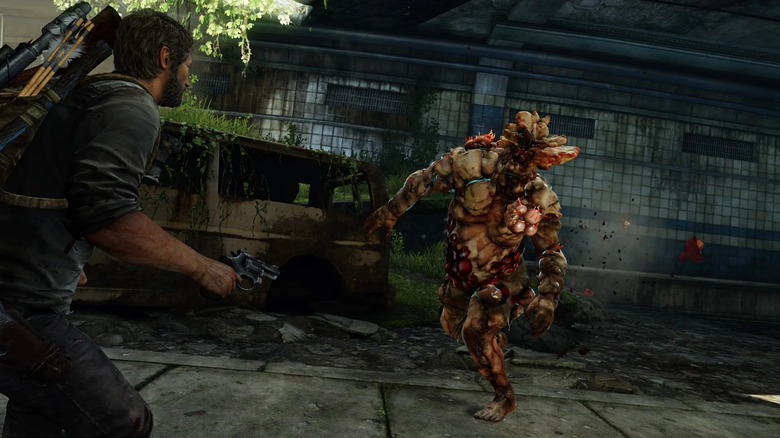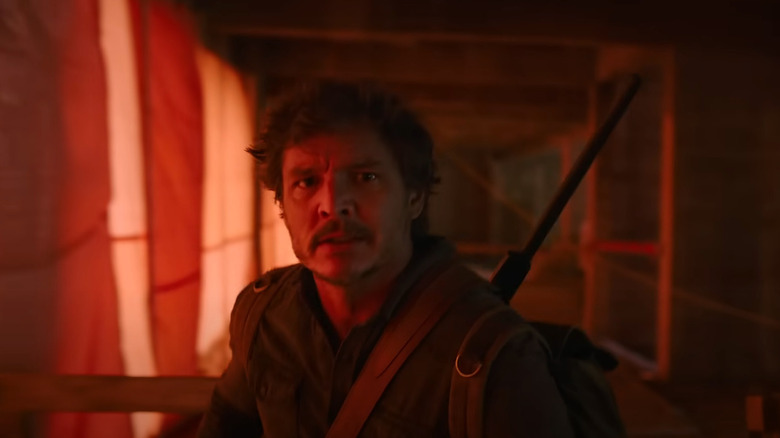The Last Of Us Season Finale Skips An Emotional Cliffhanger From The Game
Although the season finale of "The Last of Us" was mostly faithful to the source material, it did make one significant change: they cut out the game's cliffhanger where it seems like Ellie drowned. In the show, Joel's last memory before waking up in the Firefly Lab is of a stun grenade going off and an anonymous soldier knocking him out; in the game, Joel's last memory is of him attempting CPR on an unconscious Ellie. Even when a gun is pointed at his head and soldiers are telling him to put his hands up, he doesn't stop trying to save her. His final conscious moments are spent in absolute terror, with him thinking he's lost Ellie for good.
It's a moment that's great not just because of how emotional it is, but because of how much it sells us on Joel's later decision to murder all the Fireflies to save Ellie's life; in the game, his dire actions are believable because we've just seen him nearly experience Ellie's death, and we've seen how devastated that made him. It's been shown, not told, that he's willing to throw everything on the line to protect her, no matter the cost to his own well-being.
The moment also helps to explain Joel's mental state before the final battle: game viewers watch as Joel fears Ellie's dead, then discovers she's alive, only to be immediately told that the doctors are planning to kill her. That panic and grief is still fresh in his mind, and now he has to go through it all over again.
So, why'd the show change all this?
Making up for lost time
Instead of any sort of drowning sequence, the show gives us an earlier scene where Joel and Ellie have a nice little heart-to-heart about how much they care about each other. Joel finally tells Ellie the story of how he went deaf in one ear: he tried to shoot himself after his daughter's death, but he flinched and missed. The scene basically spells out for us that Joel considers Ellie to be his new daughter, and Ellie thinks of him as her new father. It also confirms that Joel would likely be suicidal if he loses his daughter again, planting the idea into viewers' heads that if the doctors killed Ellie, they'd basically be killing Joel too.
It's intended as an emotional scene, but it feels like more of an apology for the lack of on-screen bonding we've gotten to see throughout the season. In the game, we got dozens of hours of gameplay where players can watch their relationship naturally develop, so there was never any need for the characters to explicitly state how much they now care about each other. But in the show? The bond is still there and most of the emotional beats still land, but it doesn't feel quite as developed.
The show kept all the big, dramatic moments from the video game's cutscenes, but they fast-forwarded through most of the little moments in the gameplay mode. The conversations Ellie and Joel would have, or the quiet, casual way they'd work together as a team through various obstacles, was what really sold the two as an unstoppable duo, and most of that's missing here.
The case for one more episode
One can't help but wonder what "The Last of Us" season 1 would've looked like if there'd been one more episode thrown in there, to achieve the typical 10-episode count you'd expect from an HBO show. There could've been an episode between "Endure and Survive" and "Kin," or between "Kin" and "Left Behind." (The latter would be assuming that "Kin" would hold off on the injured-Joel cliffhanger.) Presumably, the episode would've told a short, standalone story where Joel and Ellie find themselves unexpectedly dealing with a horde of infected, and have to navigate the situation with that combination of force and stealth that game players are so familiar with.
This would serve to not just give us the chance to actually see how Joel and Ellie typically work together as a team by themselves for a significant period of time, but it would help to address one of the other big complaints people have about the game: the lack of zombie action. Yes, a big theme of the show is that other humans can be just as dangerous as the infected, but you do still need to include some zombies in your zombie show, and the final four episodes of this season barely have any of them. It's not a huge complaint — I'm sure the writers plan to make up for this in season 2 — but it's one that a 10-episode season could've solved.
Or better yet: an extended finale
This extra-episode suggestion might sound like filler, as the episode would technically feature no major plot points or character shifts. But filler is what helps make a show's characters feel familiar. A show's status quo needs to be firmly established before changes to said status quo can have their full impact, and this season's 9-episode rush to the finish line doesn't provide much time for this.
And if that extra episode wasn't allowed, they could've taken a cue from the game: there, the whole reason Ellie almost drowned to death in the first place was that she and Joel had just been forced to sneak and fight their way through an infected-heavy area. This would've provided the show the perfect opportunity to show Ellie and Joel working together in a tough spot, showing how good they've gotten as a team one last time before the Fireflies threatened to permanently split them apart.
Instead, "The Last of Us" opted for a finale that was only 43 minutes long. It's the shortest episode in the series, and a clear reversal of what you'd expect from the finale of an HBO series. (Or pretty much any series, for that matter.) Although the show has done a good job making the most of the time its had, we can't help but wonder why they gave themselves so little time in the first place. Season 1 did a good job developing the bond between its two main characters, but if they hadn't rushed so quickly through the source material, they could've done a great one.



